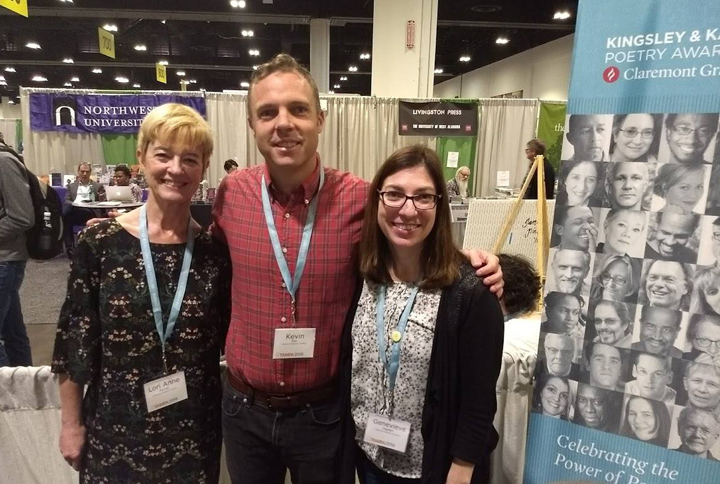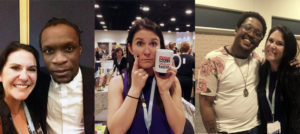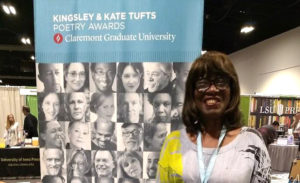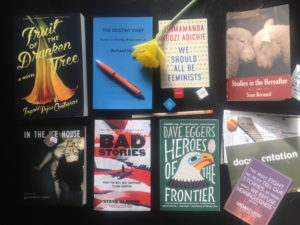AWP 2018: What Happened

While I was in a hotel lobby in Tampa, Florida, waiting for reception to figure out what was wrong with my reservation number (turns out I was in the wrong hotel), I watched an older man stand near the complementary water station and proceed to call hotel after hotel asking about room availability for the night. The side of the conversations I was eavesdropping on mostly went something like this:
“Do you have any rooms tonight?”
“Why!”
“Never heard of it!”
Periodically, he would approach the hospitality desk, red with agitation, and say, “It’s Wednesday! What the hell is going on in this town that there are no rooms available within 30 miles?”
What Red-Faced Old Man hadn’t heard of was the annual AWP (Association of Writers and Writing Programs) conference. I pity any person who unwittingly ends up needing a room in the city in which this conference takes place on the weekend that it does.
For those unfamiliar with AWP: the closest comparison I can come up with is the Comic-Con for writers. It has just as much nerding out and only slightly less cosplay. AWP is the way that die-hard Con-goers talk about the good ol’ days:
“It used to be that you could just walk in!”
“You would run into Stan Lee on the expo floor!”
But rather than the founding father of Marvel Comics, we run into Pulitzer Prize winners; Guggenheim Fellows; and of course, current and past winners of the Kingsley and Kate Tufts Poetry Awards.
Due to the storms that swept the eastern seaboard, there weren’t quite as many people wandering the book fair as usual, but there was no shortage of literary celebrities to #fangirl over.
I found 2016 Kate Tufts Discovery Award winner Danez Smith at the Split This Rock table, an incredible organization that recognizes poetry as a crucial vehicle for social justice and change. Pulitzer Prize-winner Rita Dove came by our table and I had the chance to tell her about our graduate-student poetry journal, Foothill. I caught up with 2017 Kingsley Tufts Poetry Award winner Vievee Francis, who is as charming as ever. I met and took a selfie with Ishion Hutchinson (who we interviewed in the most recent issue of Foothill).

2016 Kingsley Tufts Poetry Award winner Ross Gay read yet-unpublished poems alongside Mahogany L. Browne and Cristin O’Keefe Aptowicz at Page Meets Stage, a panel that was moderated by Taylor Mali (of the viral YouTube performance of “What Teachers Make” and on whom a blog is forthcoming), which is an event where, as he describes it, “The Pulitzer Prize meets the poetry slam.” He’s not wrong.
Aptowicz’s poems moved me to tears. I bought her new book How to Love the Empty Air later that day, and she signed it for me. Falling in love with a new author, hearing them read, then mere hours later going to a signing and getting to meet them is an only-at-AWP kind of experience. And it is wonderful.
The most touching moment for me was when Jennifer Holley Lux, Thomas Lux’s widower, walked up to our table and said, “This award changed my husband’s life.” What we do at the Tufts Awards is incredibly fun, but it’s also deeply meaningful. Supporting poetry is important work, and hearing the stories of how these awards have been influential is perhaps the best part.
Because the Kingsley & Kate Tufts Awards recipients are usually announced mid-February, at AWP we have the opportunity to meet our winners (if they’re in attendance [they usually are]) before the awards ceremony in April. This year’s Kingsley Tufts Poetry Award winner, Patricia Smith, is a tour de force, just like her poetry. We can’t wait to spend some more time with her.

Last year, I wrote about how the sentiment at 2017’s AWP in Washington, DC had a distinctively different feel from 2016’s conference in Los Angeles, likely due to the changed political climate and the conference’s location in our capital. This year, the writerly response that pervaded the general attitude was one of paralysis. A sentiment I heard more than once was the struggle that many writers had after the election: a feeling as if words—the tools of our craft—had failed us.
The inside cover flap of Steve Almond’s* new book, Bad Stories: What the Hell Just Happened to Our Country (Red Hen, 2018), puts it well:
“Nobody could explain, in any sort of coherent way, why America had elected a cruel, corrupt, and incompetent man to the Presidency.”
But with cups in which to catch the tears of White Male Writers, we write on.

*I am aware that Steve Almond is a white male writer, but I have no doubts that he would personally approve this mug as an appropriate receptacle for his tears.
—Emily Schuck
Share